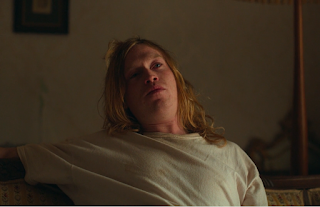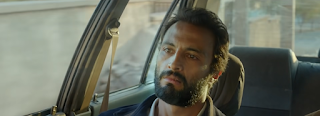Caleb Landry Jones did not receive an Oscar nomination, despite winning CANNES, for portraying the titular character in Nitram.
Nitram depicts the life of a young man who will eventually commit mass murder. An effective if rather difficult film to watch, even with the film not depicting the central character's most violent acts.
Before even discussing the deeper intentions of this work, it must be said that this is a stunning turn in the extent of the transformation of Caleb Landry Jones. If I was not aware of who was playing the part before watching the film, I probably would not have immediately guessed that this hulking and imposing figure was Caleb Landry Jones, better known for more weaker willed characters for the most part. Obscuring his early work even more is his wholly convincing Australian accent in the role, where Jones really has the most direct challenge for such an accent by performing with a cast only otherwise filled with genuine Australian performers. I'll admit when watching the film I actually first thought "wait was Caleb Landry Jones Australian this whole time?", as it is a common occurrence for an Australian performer to come along with a completely convincing American accent. However instead Jones pulls off the reverse with such ease, and his accent work isn't something you even think about, as you instantly accept his vocal work, just as you instantly accept that he is this character. Jones blends right into the Australian setting and within scenes with notable veteran Australian performers in Judy Davis (as Nitram's mother), Essie Davis and Anthony LaPaglia (as Nitram's father). Although as much as good accent can be slightly overpraised I think in the scheme of what makes a performance good, it still deserves praise, however what Jones does here deserves greater mention because it is essential in terms of moving the performance from the suggestion of such a character and instead just making it feel as though we are meeting this strange man that is Nitram.
Accepting Jones in the role is essential to his unusual portrayal of Nitram, where so often a performance is about finding the genuine humanity in a role regardless of the character, Jones's performance in a way sees to subvert the very notion. We open the film as we see Nitram's parents trying to deal with their adult son who is still living with them, as this occasional terror around the neighborhood, as we see him throwing firecrackers for no easily identifiable reason. Jones's physical performance instantly stands out, as again it is wholly different from the typical way you think of Jones. He lumbers around with this strange kind of saunter. What is notable about Jones's performance is that in the way he leans, so often keeping his head down, and just so awkwardly engages as a person physically, it feels natural within his performance while also feeling wholly unnatural in terms of how one would react to seeing Nitram. Jones doesn't present him as innately a monster, yet there is just something instantly off putting as he approaches with that odd stance and manner of his. Just in this way he almost seems like something operating at a human, yet isn't quite in the correct shell to do so. Jones's work is extremely off-putting just in this sense, as you don't know why this guy seems so strange, yet he simply is from his physical manner alone. And what is so great about Jones's work is he doesn't make it an easily identifiable single tic, it rather his whole being just doesn't seem quite right, and in turn his presence just makes you naturally unsure of things.
Jones in the early scenes of the film is instantly unnerving though he doesn't do so with these immediate kind of red flags as the psychopath. There is rather this inhumanity of just self as the man who seems so not a natural part of things. Jones even as he approaches a random woman on the beach, introducing himself and complimenting her, Jones's delivery is just not quite normal, and it is in that "not quite" that makes him so chilling. Jones projects this particular presence of someone in a way constantly trying to imply a normalcy and there is such a failure to be normal that it is extremely off-putting. There's just some early scenes of him roaming around the neighborhood that are stunning scenes of performance by Jones because never has someone just walking around seemed so odd, in a wholly tangible and unpleasant way. His playing around with firecrackers or swinging on a swing, Jones's lumbering manner has this innately aggressive quality about it. Jones's whole force of being is with this oddly pointed quality of just a fierceness even when he's not doing anything that should suggest this type of thing. There is reactive manner, an ease in just being in his way. When Jones speaks asking why a man hates him, Jones's performance is bereft of empathy or even sensibility of a normal human. He shows a man who speaks without any sense of awareness, and with this terrible hollow dispassion at times. His eyes convey a hate in a way, but not even with just the typical sense of normal directed anger, there is something deeper or more callous in his gaze that is powerfully disturbing in the generalization of it.
There is a key to this character when we see Nitram interact with the few people who actually want to interact with him. When for example his father shows him a potential inheritance and calls him a "silly boy" for his particular ways, Jones's copy cat delivery is quietly terrifying as he says the line back, as again as this man kind of mocking normal human commentary or empathy between others. This becomes most explored when he begins to interact with a lonely older woman Helen (Essie Davis). A woman clearly reaching out to him for any kind of companionship. Even in this though Jones portrays not this normal interaction. He prods and messes with her still, so far as messing with her steering wheel when she's driving, and there is this anarchist energy that Jones brings. Jones even as the woman clearly wants to connect to him, is disturbing by showing the way Nitram seems to be set on destabilizing the situation. Jones is truly brilliant in the way he manages to both have this sort of animalistic random aggression, but also this nearly childlike playful mischievousness about him. The fact that is all in this grown man, who again almost looks overgrown, makes it even more unpleasant to witness. Even as the woman clearly wants love from him, Jones doesn't play that in return in Nitram. There is rather this curios disconnect even within the seeming connection he is making. He looks at her, takes her things, plays with her, always with this manner almost like how a dog does when bite playing. He's doing something as he sees as fun and connective but in his damaging way. Jones showing Nitram interacting his own way no matter how dangerous it may be.
Eventually just before Helen were to have Nitram go away with her, Helen dies in a car accident caused by Nitram's desire to mess with the wheel again within in act of his sense of "fun". Jones's performance in the hospital immediately afterwards is amazing as again he manages to portray what is a human emotion however in that Nitram way that would seem wholly unnatural to most, yet feels wholly naturally within this presence that Jones has so successfully crafted as Nitram. This as his internalize screaming at reacting at the news of Helen's death, is this strange guttural scream, that is almost in the reverse way that most would scream, and in turn seems completely fitting to Nitram. Jones's work showing an expression of pain in Nitram in the moment, however an expression of it that as much as it portrays an emotion it portrays it in a way that is nearly alien, and in turn truly unnerving. After that we see what is this downward spiral with only his parents to help him, who both are overwhelmed yet also seemingly underwhelming in their attempts to deal with their son. Jones's performance is then this articulation of this state of the man who becomes ever more isolated and in a way more dangerous in this detachment. Jones's performance in a way becomes defined by what is really an anti-chemistry, particularly in his later scenes with LaPaglia and Davis. Together they are are so disconnected from one another. In a moment where he's scrambling to attempt to create some coherence in his mind, Jones is incredible in revealing such tremendous emotions in a scene of trying to explain himself to his mother in some way, however again in a way that feel so insular and isolated. Jones reveals such intense emotions with his performance, what would be a typical breakdown, however in this curious way that makes him just seem all the more unapproachable.
We witness then what is this horrifying path of Nitram towards what is his eventual murderous intention. In a scene where we see a contentment then is as we see him shooting or finding more weapons. Jones's performance shows this fixation on the weapon and this strange straight forward stare of his when trying his gun out. This includes even aiming his gun at the gun store owner and another patron. Jones portrays it as really this ease as though the people in front of him really are nothing, as his fixation is on the weapon is all he seems to truly be engaged with. There's a especially chilling moment even within Jones's delivery of speaking the way of the faster shooting gun by imitating the sound, Jones speaks with this focus and obsession over the gun rather than over the person he is talking to. Jones's performance isn't really one about change, it isn't as though Nitram is worse at the start than he is just before he commits his nightmarish acts. Jones rather presents a man disconnected with the reality around him, the people around him, but really even his own mental state. Jones shows this nearly alien state of a man who almost nearly feels as a kind of creature who only seems to know how to try to connect with others through violent acts. His initial acts of throwing the fireworks are directly connected to his final act of going on a merciless shooting spree. In both Jones presents this most terrifying contentment Nitram has with violence that acts as his outlet for the world. The final scene of his performance is extremely disturbing because before Nitram goes on his killings he eats and drinks for a meal. Jones makes it so disturbing because nothing in his eyes, or his manner suggests someone who is going to do something that is different for him, or even something that at all scares him. It isn't a turning point in Jones's performance it is rather just a new form of expression for him.There is this sense of contentment that Jones depicts as prepares for the killings, a contentment of a man just being himself. This is an outstanding performance by Caleb Landry Jones. The horror of the film, and what makes it so anxiety inducing, is not really what we see but what is implied and what is created by Jones's performance.There is never a moment you don't believe Jones in this character, and that is what makes this work so terrifying. A performance that isn't about finding the humanity in someone capable of heinous acts, rather it is this unsettling portrait by Jones as he so tangibly reveals the missing compassion and connection of such a person.
















